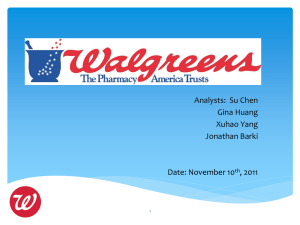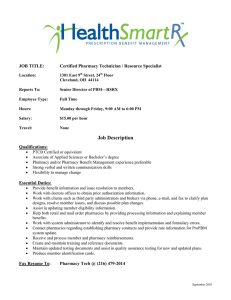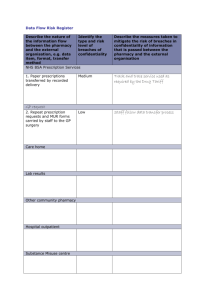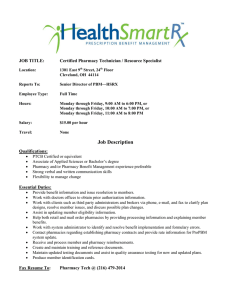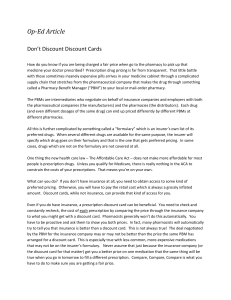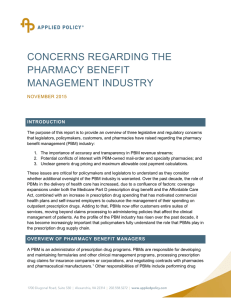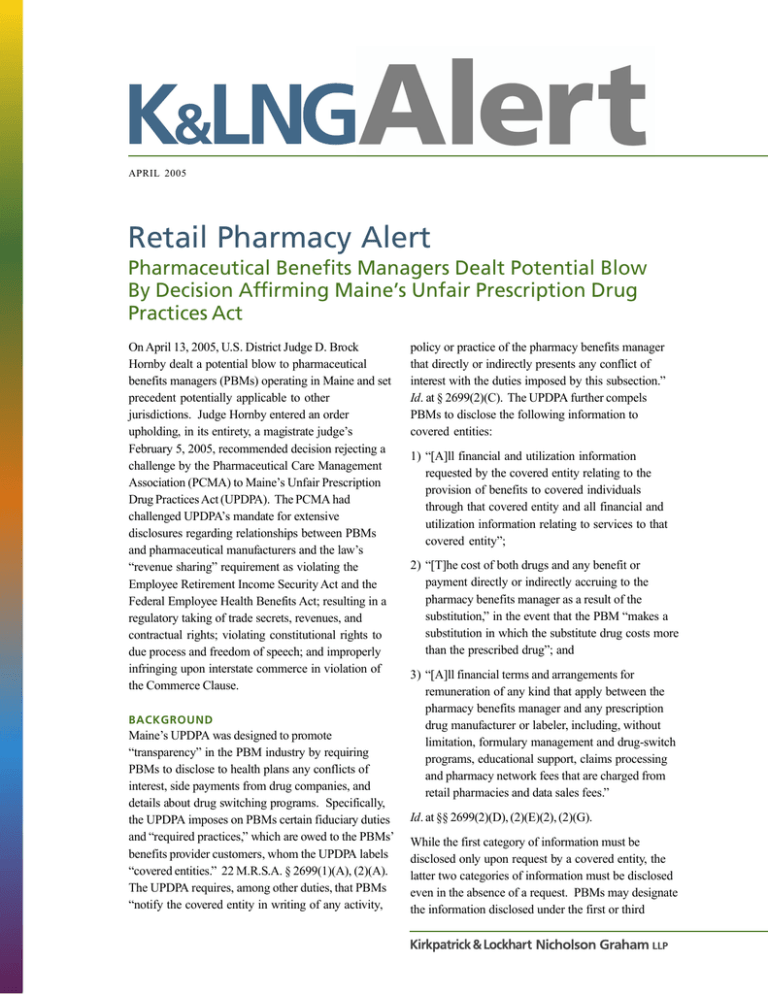
APRIL 2005
Retail Pharmacy Alert
Pharmaceutical Benefits Managers Dealt Potential Blow
By Decision Affirming Maine’s Unfair Prescription Drug
Practices Act
On April 13, 2005, U.S. District Judge D. Brock
Hornby dealt a potential blow to pharmaceutical
benefits managers (PBMs) operating in Maine and set
precedent potentially applicable to other
jurisdictions. Judge Hornby entered an order
upholding, in its entirety, a magistrate judge’s
February 5, 2005, recommended decision rejecting a
challenge by the Pharmaceutical Care Management
Association (PCMA) to Maine’s Unfair Prescription
Drug Practices Act (UPDPA). The PCMA had
challenged UPDPA’s mandate for extensive
disclosures regarding relationships between PBMs
and pharmaceutical manufacturers and the law’s
“revenue sharing” requirement as violating the
Employee Retirement Income Security Act and the
Federal Employee Health Benefits Act; resulting in a
regulatory taking of trade secrets, revenues, and
contractual rights; violating constitutional rights to
due process and freedom of speech; and improperly
infringing upon interstate commerce in violation of
the Commerce Clause.
BACKGROUND
Maine’s UPDPA was designed to promote
“transparency” in the PBM industry by requiring
PBMs to disclose to health plans any conflicts of
interest, side payments from drug companies, and
details about drug switching programs. Specifically,
the UPDPA imposes on PBMs certain fiduciary duties
and “required practices,” which are owed to the PBMs’
benefits provider customers, whom the UPDPA labels
“covered entities.” 22 M.R.S.A. § 2699(1)(A), (2)(A).
The UPDPA requires, among other duties, that PBMs
“notify the covered entity in writing of any activity,
policy or practice of the pharmacy benefits manager
that directly or indirectly presents any conflict of
interest with the duties imposed by this subsection.”
Id. at § 2699(2)(C). The UPDPA further compels
PBMs to disclose the following information to
covered entities:
1) “[A]ll financial and utilization information
requested by the covered entity relating to the
provision of benefits to covered individuals
through that covered entity and all financial and
utilization information relating to services to that
covered entity”;
2) “[T]he cost of both drugs and any benefit or
payment directly or indirectly accruing to the
pharmacy benefits manager as a result of the
substitution,” in the event that the PBM “makes a
substitution in which the substitute drug costs more
than the prescribed drug”; and
3) “[A]ll financial terms and arrangements for
remuneration of any kind that apply between the
pharmacy benefits manager and any prescription
drug manufacturer or labeler, including, without
limitation, formulary management and drug-switch
programs, educational support, claims processing
and pharmacy network fees that are charged from
retail pharmacies and data sales fees.”
Id. at §§ 2699(2)(D), (2)(E)(2), (2)(G).
While the first category of information must be
disclosed only upon request by a covered entity, the
latter two categories of information must be disclosed
even in the absence of a request. PBMs may designate
the information disclosed under the first or third
category as confidential. Id. at §§ 2699(2)(D), (2)(E)(2),
(2)(G). “Information designated as confidential by a
pharmacy benefits manager and provided to a covered
entity . . . may not be disclosed by the covered entity to
any person without the consent of the pharmacy
benefits manager” or in the absence of a court order or
an investigative demand made by the Attorney General
in an effort to police compliance with the UPDPA. Id.
at § 2699(2)(D), (2)(G).
In addition to the foregoing disclosures, the UPDPA
requires PBMs to pass on, in full, to covered entities
“any payment or benefit” that is received “based on
volume of sales for certain prescription drugs or classes
or brands of drugs within the State,” as well as for drug
substitution, including substitution of “a lower-priced
generic and therapeutically equivalent drug for a
higher-priced prescribed drug.” Id. at 2699(2)(E)(3). A
violation of the UPDPA “is a violation of the Maine
Unfair Trade Practices Act, for which a fine of not more
than $10,000 may be adjudged.” Id. at § 2699(4).
ACTION BY THE U.S. DISTRICT COURT
On February 5, 2005, U.S. Magistrate Judge Margaret
Kravchuck issued a recommended decision rejecting
the PCMA’s challenges to the statute. Observing that,
“[w]hether and how a PBM actually saves an
individual benefits provider customer money with
respect to the purchase of a particular prescription drug
is largely a mystery to the [health care] benefits
provider,” Judge Kravchuk concluded that “it is
difficult for a [health care] benefits manager to know
whether it is getting a lower net cost for a drug received
through a PBM due to lack of transparency in the
market.” Relying in substantial part upon testimony
offered by Stephen W. Shondelmeyer of the University
of Minnesota College of Pharmacy, she explained:
For instance, if a drug manufacturer provides a higher
rebate to a PBM on a $100 drug than it does on a $20 drug
and the PBM shares the rebate with the benefits provider, it
may appear to the benefits provider as though it is saving
money. However, it is just as likely that the amount of
rebate received by the benefits provider does not make up
for the higher base price of the more expensive drug, so that
the net economic effect to the benefits provider is a loss.
This lack of transparency also has a tendency to undermine
a benefits provider’s ability to determine which is the best
proposal among competing proposals from PBMs. For
example, if a benefits provider had proposals from three
different PBMs for pharmacy benefits management
services, each guaranteeing a particular dollar amount of
rebate per prescription, the PBM proposal offering the
highest rebate for each prescription filled could actually be
2 APRIL 2005
the worst proposal as far as net cost savings are
concerned, because that PBM might have a deal with the
manufacturer that gives it an incentive to sell, or restrict its
formulary to, the most expensive drugs. In other words,
although PBMs afford a valuable bundle of services to
benefits providers, they also introduce a layer of fog to the
market that prevents benefits managers from fully
understanding how best to minimize their net prescription
drug costs.
Turning to the merits of the claims, Kravchuk’s
recommended decision found that the UPDPA was
aimed at governing the practices of PBMs, not health
plans, and that it did not reach into areas of regulation
reserved to the Federal government. She further found
that Maine had a substantial government interest in
enacting the law, namely, increasing public access to
prescription drugs, and that the UPDPA was likely to
advance that government interest “because it is
designed to create incentives within the market for the
abandonment of certain practices that are likely to
increase cost without providing any corresponding
benefit to the individual whose prescription is being
filled and that appear to be designed merely to
improve a drug manufacturer’s market share.”
IMPLICATIONS FOR RETAIL PHARMACIES
AND PBMS
Maine’s UPDPA, which had been put on hold pending
the outcome of PCMA’s challenge, is the first of its
kind. Similar PBM disclosure laws were recently
rejected by several states, including California,
Florida and New York, and PCMA successfully
obtained a preliminary injunction barring
enforcement of a similar statute in the District of
Columbia. Judge Hornby’s decision may prompt
other states to consider (or reconsider) following
Maine’s lead with respect to PBM disclosure
legislation.
Public and private health care benefit plans may
embrace Judge Hornby’s decision because it forces
PMBs to pass on certain discounts and rebates to
health care plans and ensures access to information
necessary to ensure that contracts with PBMs are
administered in the best interests of health care plans
and their subscribers.
PBMs, on the other hand, contend that PBM
disclosure-fiduciary laws, like the UPDPA, will
increase prescription drug costs for consumers,
employers, and government. A prior PCMA press
statement cited a PricewaterhouseCoopers study that
estimated Maine’s UPDPA would increase prescription
KIRKPATRICK & LOCKHART NICHOLSON GRAHAM LLP
drug costs for Maine consumers and employers by 10.2 lower their mail-order rates, thus making their mailpercent over the next ten years.
order pharmacies more attractive to public and private
health care benefit plans and patients. By requiring
On its face, Maine’s UPDPA may not appear directly
the passing on of discounts and rebates, the UPDPA
beneficial to retail pharmacies because pharmacies are
will, to some degree, level the competitive playing
not provided access to information disclosed by PBMs
field between retail pharmacies and PBM-owned mailand discounts and rebates are required to be paid solely
order pharmacies.
to health plans rather than pharmacies. Furthermore, to
the extent findings of PricewaterhouseCoopers are
Responding to Judge Hornby’s decision, Stephanie
correct, implementation of the legislation may force
Kanwit, an attorney representing PCMA, was quoted
PBMs to pursue further reductions of compensation
as stating, “[t]his is by no means the last word on the
paid to retail pharmacies to offset the loss of discounts subject.” PCMA has already filed an appeal to the
and rebates. In application, however, the UPDPA may
United States Court of Appeals for the First Circuit,
benefit retail phamacies on a number of fronts. For
which can affirm, affirm in part, or reverse Judge
example, when PBMs keep manufactuer rebates, they
Hornby’s decision. PCMA has also filed papers with
have an incentive to “switch” patients to higher-cost
the District Court seeking to have an earlier injunction
brand name drugs. The UPDPA limits “switching” and blocking implementation of the UPDPA maintained
requires PBMs to pass along manufacturer discounts
while its appeal is pending. The case is
and rebates, thereby encouraging the dispensing of
Pharmaceutical Care Management Association v.
generic medications over brand name drugs. Because
Rowe, Civil No. 03-153-B-H (D. Me.).
retail pharmacies tend to make more profit from the sale
of generic medications, the UPDPA’s encouragement of
generic dispensing may benefit retail pharmacies. Also, Christopher R. Nestor
cnestor@klng.com
the UPDPA’s requirement that PBMs pass on certain
717.231.4812
discounts and rebates will likely benefit retail
pharmacies competing with PBM-owned mail-order
Raymond P. Pepe
pharmacies. Currently, PBMs are able to use rebates
rpepe@klng.com
they earn from community pharmacy dispensing to
717.231.5988
If you have questions or would like more information about K&LNG’s retail pharmacy practice,
please contact one of our lawyers listed below:
Harrisburg
Raymond P. Pepe
David R. Overstreet
717.231.5988
717.231.4517
rpepe@klng.com
doverstreet@klng.com
www
w.. k l n g . c o m
BOSTON
■
DALLAS
■
HARRISBURG
■
LONDON
■
LOS ANGELES
■
MIAMI NEWARK
■
■
NEW YORK
■
PITTSBURGH
■
SAN FRANCISCO
■
WASHINGTON
Kirkpatrick & Lockhart Nicholson Graham LLP (K&LNG) has approximately 950 lawyers and represents entrepreneurs, growth and middle market companies and leading FORTUNE 100
and FTSE 100 global corporations nationally and internationally.
K&LNG is a combination of two limited liability partnerships, each named Kirkpatrick & Lockhart Nicholson Graham LLP, one qualified in Delaware, U.S.A. and practicing from offices in
Boston, Dallas, Harrisburg, Los Angeles, Miami, Newark, New York, Pittsburgh, San Francisco and Washington and one incorporated in England practicing from the London office.
This publication/newsletter is for informational purposes and does not contain or convey legal advice. The information herein should not be used or relied upon in regard to any particular
facts or circumstances without first consulting a lawyer.
Unless otherwise indicated, the lawyers are not certified by the Texas Board of Legal Specialization.
Data Protection Act 1988 - We may contact you from time to time with information on Kirkpatrick & Lockhart Nicholson Graham LLP seminars and with our regular newsletters, which may be
of interest to you. We will not provide your details to any third parties. Please e-mail cgregory@klng.com if you would prefer not to receive this information.
© 2005 KIRKPATRICK & LOCKHART NICHOLSON GRAHAM LLP. ALL RIGHTS RESERVED.

